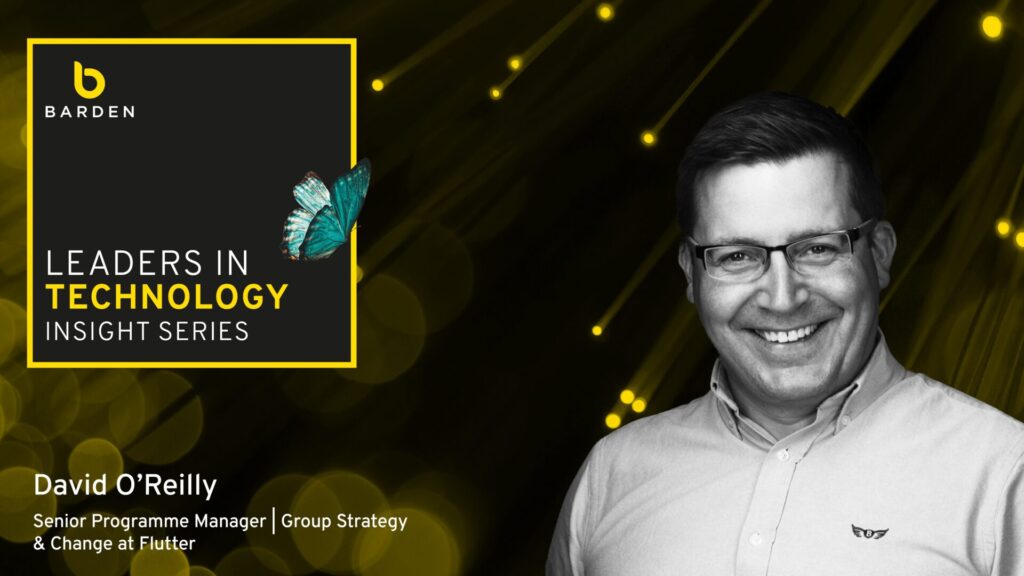Can you tell us about your background and career to date?
I have extensive experience in programme transformation and change management across various industries including gaming, financial, energy, and aviation, including consultancy roles at EY and KPMG which elevated my expertise.
I spent nearly six years in Chicago with United Airlines in innovation for customer journeys and applications, working with global teams and gaining valuable cultural insights. This experience has greatly contributed to my career progression.
In January 2023, I joined Flutter to lead tier 1 initiatives for the delivery of our first global group cloud platform. This was supported by the creation of a new global services division that enables global collaboration and innovation within this high-speed platform that was launched in June 2024.
What has working in different countries, with diverse cultures and teams, taught you about being a leader in transformation?
Travelling and working in diverse areas and environments has heightened my emotional intelligence, showing me that each culture and mindset are unique. For example, setting up a tech hub in India and a data centre in the US taught me the importance of integrating with the local ethos and the way we work together.
It’s not as simple as just setting up a location and filling it with people; it requires an understanding of the local people and their culture. These experiences have taught me to approach leadership in different ways as my career has progressed, bringing in considerations from various perspectives and cultural nuances. This mindset has been instrumental in helping me to develop the next generation of leaders.
Appreciating and supporting people and cultures, and how we collaborate while we strive to achieve our goals has emphasised this importance to me, creating and supporting different work environments, wellbeing programmes, and people’s career paths has enriched both my personal and professional life. It helped me to make the decision to pursue my personal development with a degree in business psychology in the USA, improving my ability to listen, communicate, support, and lead teams more effectively.
What other factors are important to be successful in a career in project management?
Projects and programmes are all about constant transformation. From my point of view, it’s essential to embrace change and cultural transformation. In many organisations, technology and business often operate separately, with each believing they can function independently. However, the reality is that both need to work together to drive change and transformation – business and technology need to be one.
Technology evolves rapidly, and integrating change into the culture is key. At Flutter, the leadership supports a mindset of constant change, which is essential for future success. We prioritise customer focus but also recognise that our internal teams enable our success. We have eliminated the term ‘BAU’ from our terminology because every role is significant, and we are in a state of constant flux. Change management is embedded in our daily operations and everyone’s role, making it a core part of the organisation’s DNA.

Flutter is quite advanced in technology adoption and utilisation. Are there any tools that have made a significant impact on the business? And do you think tools like AI will be fundamental in the coming months and years?
The biggest foundational technology shift has been moving from on-premises technology to a cloud-based environment, which has been transformative for developers and product teams. This allows us to focus on providing better services rather than utilising expertise for hosting. Our primary focus is on stability and speed which all enable innovation.
AI is particularly exciting. Although machine learning has been around for some time, AI is rapidly growing and evolving. Flutter is currently spearheading a large number of AI projects globally, focused on machine learning and generative AI, leading to an expected 30% year-on-year growth of AI integration. I see AI as a game-changer for high-growth technology-enabled organisations. However, this growth isn’t just about advancements but also about responsibility, as we have to be aware of both the benefits and the potential risks of AI.
On that note, what considerations does your organisation have regarding the potential negative impacts of these tools? How are you addressing these concerns?
By human nature, change in any respect can be seen as a negative as it disrupts what we are accustomed to in our day-to-day lives. In reality, if we embrace the right kind of change, it will help us evolve the way we think, live, and work – Such as the mobile phone in more recent years.
There is a massive upside for commercial organisations by leading by example in the area of AI integration. Proving once again that technology can enable us to focus on what’s important: Our people and our customers.
I believe if we support each other on this journey of AI, it will help build understanding and excitement through knowledge sharing and education, and allow people to focus on what matters, through consistent innovation, benefiting our end users.
We will also prioritise codes of ethics, security, and data privacy frameworks. As we advance in the world of AI, multiple programmes have been launched to address these concerns comprehensively – I believe that this should become a legal requirement for any organisation globally.
It’s irresponsible for an organisation to integrate AI without these core frameworks. We must ensure that all customer interests are protected responsibly.
What challenges are you facing in talent attraction, particularly in the technology space, and what strategies are you using for talent retention?
Talent attraction is crucial. When I joined Flutter 16 months ago, we had to make significant changes to attract top talent. Competing with tech giants like Facebook and Google, we needed to build our brand as a desirable workplace. We focused on highlighting our commitment to industry standards, ethical initiatives, technology integration, and cultural change. Being clear about our ESG and DEI initiatives helped us transform from an unknown entity to a sought-after global corporation with cutting-edge technology and innovative projects. Now, people recognise us as leaders in technology and cultural transformation and are eager to be part of our journey.
Retention is equally challenging, especially with competitive market offers. Our key strategy is creating a supportive and engaging work environment. We implement fair goal-setting, clear career paths, and opportunities for professional growth. Adapting to post-COVID-19 work considerations, such as remote work flexibility, is also crucial. We offer conditions that suit our employees’ needs, helping retain talent.
We provide a framework where teams can excel and do what they love. Ensuring leaders and managers support these values is essential. This inclusive approach makes us more stable and attractive to top talent. By advising and supporting our teams, we foster an environment where people are motivated and equipped to be their best, which is vital for both attraction and retention. People stay in organisations because of people; enabling our people to do great things helps our organisation achieve great things.


 Jump Back
Jump Back

